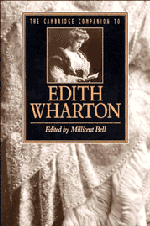Book contents
- Frontmatter
- Introduction
- 1 The Social Subject in The Age of Innocence
- 2 Edith Wharton and the Science of Manners
- 3 Edith Wharton and Race
- 4 The Custom of the Country
- 5 The Female Conscience in Wharton's Shorter Fiction
- 6 Law, Language, and Ritual in Summer
- 7 The House of Mirth
- 8 The Fruit of the Tree
- 9 The Valley of Decision
- 10 Edith Wharton's Valley of Decision
- Bibliography
- Index
- Series List
6 - Law, Language, and Ritual in Summer
Published online by Cambridge University Press: 28 May 2006
- Frontmatter
- Introduction
- 1 The Social Subject in The Age of Innocence
- 2 Edith Wharton and the Science of Manners
- 3 Edith Wharton and Race
- 4 The Custom of the Country
- 5 The Female Conscience in Wharton's Shorter Fiction
- 6 Law, Language, and Ritual in Summer
- 7 The House of Mirth
- 8 The Fruit of the Tree
- 9 The Valley of Decision
- 10 Edith Wharton's Valley of Decision
- Bibliography
- Index
- Series List
Summary
At first glance, Summer (1917) does not seem to fit the mold of the novel of manners, the genre usually associated with Edith Wharton. This short novel primarily involves people of a lower class than is typical of the genre: there are no salons, grand balls, vast estates, sparkling wordplay, no meddling mother trying to marry off her daughter, no comic relief. Still, the story does involve a marriageable yet resistant young woman who must come to terms with the symbolic order (which can be thought of as the sociocultural matrix by which things and actions are interpreted) through courtship, social ritual, and, finally, marriage. But the foregrounding of Charity Royall's resistance to this incorporation on the one hand, and her apparent final capitulation to it on the other, has led readers of Summer down two different interpretive paths.
In brief, the plot of Summer revolves around Charity Royall, a young woman of obscure parentage who has been reared by two foster parents, Lawyer and Mrs. Royall. Mrs. Royall has been dead a few years when the narrative begins. Charity still lives with Lawyer Royall in a small Massachusetts town called North Dormer; although she yearns to escape, we learn that she has recently turned down a chance to attend boarding school because she feels obligated to Lawyer Royall, who would be “too lonesome” without her. However, Royall eventually tries to seduce his foster daughter, then twice asks her to be his wife: Charity is revolted. She instead falls in love with a visitor to North Dormer, an urbane young architect named Lucius Harney.
- Type
- Chapter
- Information
- The Cambridge Companion to Edith Wharton , pp. 117 - 136Publisher: Cambridge University PressPrint publication year: 1995
- 4
- Cited by

